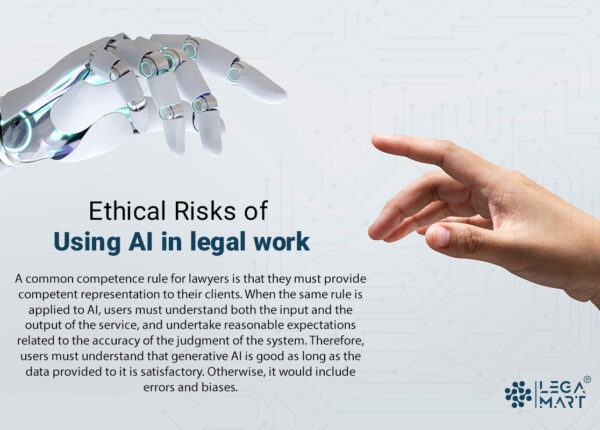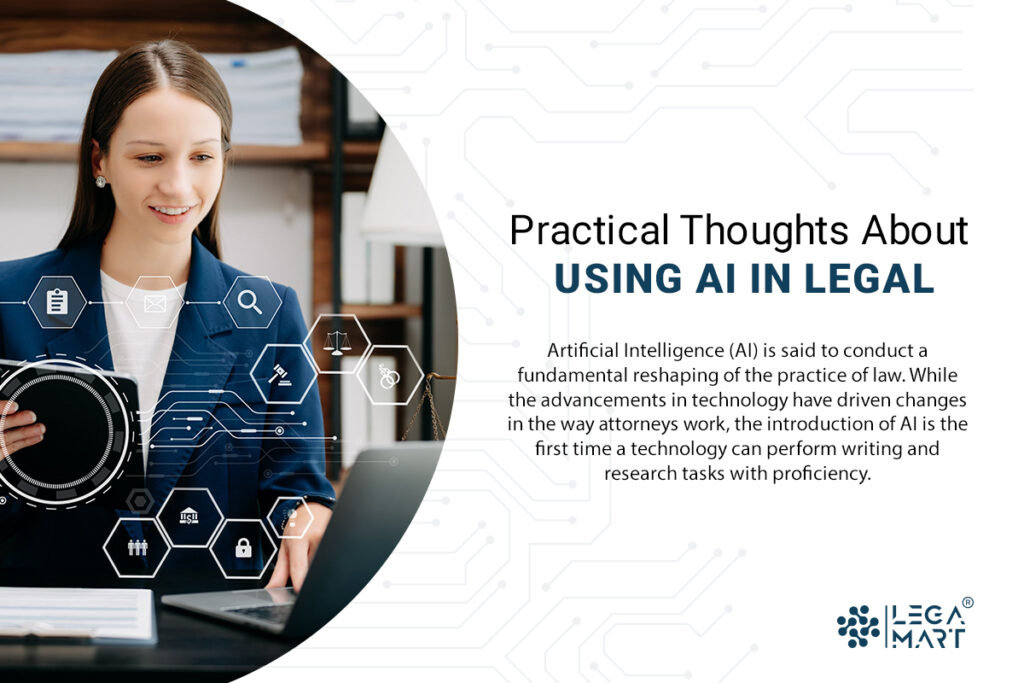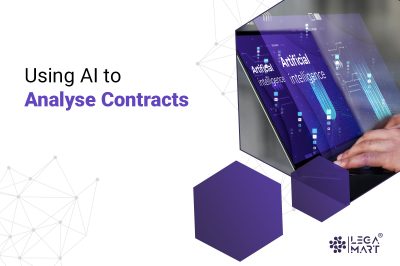Introduction
Artificial Intelligence (AI) is said to conduct a fundamental reshaping of the practice of law. While the advancements in technology have driven changes in the way attorneys work, the introduction of AI is the first time a technology can perform writing and research tasks with proficiency. This is why it is now a common understanding that law firms that leverage emerging AI technologies shall be able to offer services with higher efficiency and lower costs, with a good understanding of the odds in their favor. At the same time, if law firms fail to leverage the use of AI, they might face issues in the form of losing clients, not remaining cost-competitive, and not being able to attract or retain talent.
This article aims at providing a practical understanding of using AI in legal practice, and how it has the capability of being a game-changer for the coming times.
What is Artificial Intelligence?
In layman’s understanding, AI is used as a description of technologies that use computers and software for the creation of humanlike, intelligent behavior. Some common examples of AI that you may see around you today are Siri, Alexa, or even Google Search. Based on your searches, you often get recommendations for products and services, which is another AI feature.
There are mainly 5 main components of AI – Perception, Learning, Reasoning, Problem-solving, and Language Understanding. For the fulfilment of these features, there are certain terms that accompany AI in all its forms. These are:
- Machine Learning – It can be identified as a subset of AI, where computers are trained through the data input. Eventually, through the identification of data patterns, the machine ends up drawing conclusions and learning the outcome.
- Natural Language Processing (NLP) – This component helps the machine to communicate with people. NLP is used by machines to read and process any speech or text and interpret it. Therefore, this is the stage where computers start acting as humans during text processing procedure.
- Robotics – This is a branch of computer science and engineering that creates robots and machines.
It was only in 2022 that the world started understanding the concept of Generative AI through the introduction of ChatGPT, which was a sophisticated chatbot from artificial intelligence research nonprofit OpenAI. Through generative AI, it was now possible to generate ‘output’, by putting in instructions in the form of ‘prompts’ or ‘inputs’. The unique feature of this AI was that it drew on enormous sources for the formation of instantaneous content in different forms, such as essays, blogs, images, videos, codes, etc., based on user preferences.
The Increasing Usage of AI in Law
The use of AI in the legal industry is expected to grow from $0.94 billion in 2023 to $3.29 billion by 2028, as per Mordor Intelligence Report. This clearly means that AI is here to stay and there is bound to be a significant rise in using AI in law. In fact, there have already been some noteworthy examples of the use of AI in law:
- Originally developed as a chatbot to help people challenge parking tickets, DoNotPay is now an AI-powered “robot lawyer” offering a range of legal services. Recently, DoNotPay has also prevailed in a court case against a small Illinois law firm, wherein the company was accused of causing “irreparable harm” to individuals and infringing on the rights of law firms which employ properly licensed professionals. However, DoNotPay won the case since the company was not considered to be a direct competitor.
As of 2023, DoNotPay has been used in more than 250,000 cases and has won 160,000 of them, hence having a success rate of 64%.
- In February, Allen & Ovary, which is a leading M&A Litigation firm, launched their own AI bot “Harvey”. The bot has been based on OpenAI’s GPT-4 model and is used by the firm to perform thier legal tasks.
- FedJudge, which is a Federated Legal Large Language Model framework, is being used to address data privacy issues with AI, by limiting the use of sensitive information.
- Techniques such as the “chain of thought” have emerged to enhance the contextual understanding of AI. Through this technique, it has become easier to break down complex legal problems into sequential steps.
These examples clearly highlight the increased trend in the use and performance of AI. However, the use is not limited to these. Today, lawyers at the initial stage of their careers are also capable of using Machine Learning to perform their legal tasks due to the emergence of various noteworthy start-ups:
- Lawgeex – This software helps in reviewing contracts faster, and sometimes even more accurately than humans.
- CS Disco – This company provides AI-powered discovery services to law firms across the US.
- Westlaw Edge – This service had been launched by Thomson Reuters over 3 years ago. One of the key features of this service is the keyword and boolean search which has been augmented by semantic search. This means that the algorithm used by the service is not just matching the keywords, but is also trying to understad the meaning of the words.
- Quick Check – another Westlaw Edge service. It is used to analyze any draft argument and gain further insights on factors that might not have been taken into consideration.
- Lex Machina – This company makes use of predictive analysis and machine learning to draw insights on lawyers, individual judges, and the case. This helps in predicting the behaviors and outcomes related to your case.
- Correctional Offender Management Profiling for Alternative Sanctions (COMPAS) – This tool is often used by criminal judges in many states to determine a defendant’s or convicted person’s likelihood of re-offending when making decisions about pre-trial detention, sentencing, or early release. While there are accusations of racial bias on the software, the capabiities of the software cannot be ignored.
Advantages of Using AI in Law
There has been a significant rise in using AI in the legal profession, considering the various advantages that AI provides through increased productivity, improved decision-making, and higher competitiveness. Many advantages of using AI have come forth in the legal industry:
- More Productivity – It is now possible to automate routine tasks, that would otherwise have taken a lot of time and effort. This means that it is not possible for legal professionals to divert their attention to core business functions. Further, they are now able to spend more time with the clients, which helps them in marketing themselves in a better manner. With increased productivity, it has become possible to eliminate the human error possibility, with increased efficiency.
- Improved Access to Justice – Many can relate to the fact that legal help is expensive, and often unaffordable. However, now, by using AI in legal, legal services have become more accessible to individuals and affordable. How? – If a research took 24 hours earlier, it meant that it resulted in high costs since less work was being done in more time. Now, it is possible to do the same research in a few minutes, reducing the costs.
- Better Client-Centred Experience – It has now become possible for legal professionals to create closer and more meaningful experiences with their clients. This helps them in creating a long-term trust with their clients, which leads to the creation of better growth opportunities for their careers.
Ethical Risks of Using AI in legal work

Considering that AI is largely dependent on the algorithm that it is being fed, it is important to consider the possible ethical risks that the system is capable of posing in your legal work:
Competence
A common competence rule for lawyers is that they must provide competent representation to their clients. When the same rule is applied to AI, users must understand both the input and the output of the service, and undertake reasonable expectations related to the accuracy of the judgment of the system. Therefore, users must understand that generative AI is good as long as the data provided to it is satisfactory. Otherwise, it would include errors and biases.
Confidentiality of Information
A common confidentiality rule for lawyers is that they must maintain attorney-client privilege, wherein they must protect the client’s information from unintended recipients. When this rule is applied to technology, it relates to the transmission, storage, and destruction of sensitive information within the system. Therefore, users must ensure that they have checked how the AI system stores and shares the information with third parties.
Uses of AI in Law
The following are some common uses of AI that firms can undertake in the legal profession:
Contract Analysis and Review
This means that the AI system may examine the key terms, potential risks, and compliance requirements, based on the contract that it reviews. Lawyers undertake contract analysis and review in significant time and effort, through the study of lengthy and complex documents. Typically, a legal department spends 50% of its time reviewing contracts and related documents. However, through the use of AI, the process can become automated, wherein the algorithm can extract critical information in minutes. This means that legal specialists would be able to:
- Identify clauses, provisions, and obligations, hence, allowing AI lawyers to gain a comprehensive understanding of the contents of the contract.
- Flag causes which deviate from the industry standards.
- Detecting inconsistencies.
- Generate automated summary reports.
Due Diligence
Due Diligence is especially important in mergers and acquisitions, regulatory compliance, and contract management. Through the use of AI systems, it becomes easier to process structured and unstructured data, such as contracts, financial records, regulatory filings, and public information sources. AI platforms tend to integrate various data sources and apply advanced algorithms to be able to extract relevant information, flag potential compliance risks, identify key contractual terms, and compare financial records. This allows you to focus on risk assessment and deeper analysis.
Intellectual Property Management
AI can assist you in streamlining tasks related to trademark monitoring, patent search, and IP Portfolio Management. This becomes easier through AI since they can analyze extensive databases in a faster manner. Further, it monitors various websites, social media, and e-commerce platforms and easily detects potential infringements and unauthorized use of intellectual property.
Virtual Assistants and Chatbots
AI-powered virtual assistants and chatbots are capable of being personal helpers and providing customer support 24/7. An AI Legal Assistant can understand the client’s needs and provide them with the relevant guidance and information related to your problem. It can also assist in client onboarding through the collection of initial case details, which allows the lawyers to provide tailored advice.
Predictive Analytics for Case Outcomes
Currently, nearly 59% of companies make use of AI to assess their legal cases, and almost 48% of companies employ AI to develop effective case strategies. Through the use of predictive analytics, we can make use of historical case data to forecast the future outcomes of your case. This is done by examining and analyzing past judge rulings, case facts, legal precedents, etc. Therefore, AI can help lawyers in managing their client expectations.
Smart Automated Contracting
AI technology helps in generating legal documents, by faster, more efficient, and less error-prone contracting. This is done by using predefined templates and variables, and smart systems to create customized contracts, agreements, and legal forms, which are tailored to specific requirements.
Is the Future Equation: AI = Law?
Only time can provide us with the answers, however, AI continues to raise various questions in context of the legal profession:
- Can the use of AI in the legal processes other than for discovery, be considered a malpractice?
- If AI tools are beneficial to a criminal defendant’s case, should they be allowed access to them?
- Do lawyers have to reveal when they use AI in court? If so, are the training data or other inputs that were used to set up the ML models required to be disclosed?
- How can we be certain that there isn’t any ingrained prejudice that represents racist or sexist beliefs?
You can add on to this list of concerns. While the use of AI has been a welcome tool for justice, moral hazards and lack of accountability seem to be the main concerns in the background of its growing popularity.
It becomes more problematic when AI is used to replace human judgment, especially in the context of criminal law. AI is still not prepared for this, and our moral inhibitions might push such a possibility to the extreme future.
More significantly, though, it might be morally unacceptable to let algorithms make choices that restrict people’s freedom. Machine learning algorithms may eventually be able to accurately predict, much like the science fiction film “Minority Report”, when an individual is likely to commit a crime in the future. The potential for judges, attorneys, and society at large to come to place an excessive amount of trust in these algorithms is another strong argument against the use of AI in law.
Conclusion
To conclude, AI has been a revolution for the legal industry, wherein it is now easier to undertake important legal tasks more efficiently and conveniently. However, it is important for the firms to take into consideration the risks that these AI systems may pose, and to work towards mitigating them beforehand. Regulating AI might be a good start for the same.
The experienced team of LegaMart can provide you with personalized solutions for your legal problems quickly and efficiently. Find us now!
Frequently Asked Questions (FAQs)
What are the Benefits of Using AI in law?
AI may be used to increase efficiency and productivity through the automation of repetitive tasks. Further, it helps improve accuracy in legal research and analysis through enhanced access to legal information, services, and sources.
Can AI Completely Replace Attorneys?
While AI is capable of replacing certain aspects of the legal industry (since it exponentially reduces the time undertaken to complete certain tasks), it is unlikely to completely replace attorneys anytime soon. AI still has a long way to go to reduce the issues of data privacy, client confidentiality concerns, etc. It continues to be less secure and reliable, in comparison to human attorneys.




